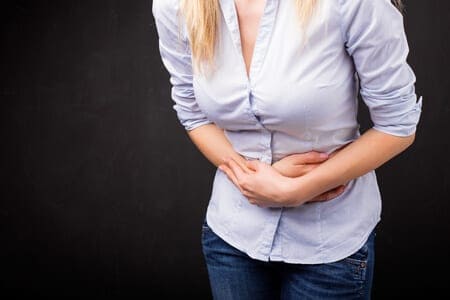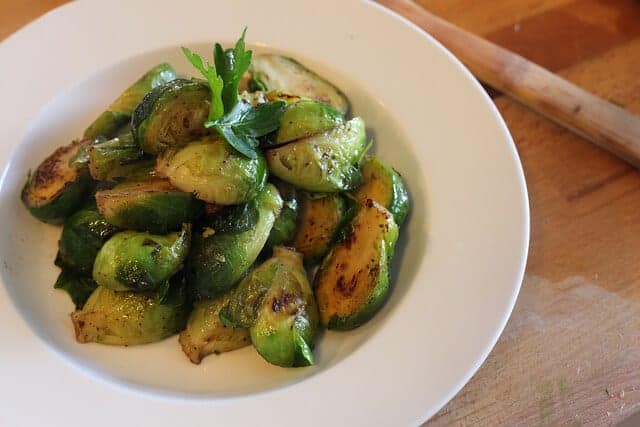Let’s be honest — we’ve all experienced constipation and some accompanying bloating at one point or another in our lives. Although many of us are too embarrassed to ever admit it, we’ve all suffered from it. In fact, constipation is one of top reasons people visit the gastroenterologist.

“For many, it’s too embarrassing to discuss and so they may not bring it up with their doctor until it reaches the point where it’s extremely uncomfortable,” Dr. Eric Esrailian, co-chief of the Vatche and Tamar Manoukian Division of Digestive Diseases at UCLA, told TODAY. “They may not even discuss it with family and friends.”
Constipation is caused by a variety of reasons such as poor diet, dehydration and stress. Some medications, like painkillers, can also cause problems with bowel movements.
Some signs that you’re constipated include passing fewer than three stools a week, straining or having difficult to pass bowel movements as well as having some stomach bloating. If constipation continues, it could lead to hemorrhoids, anal fissures and other uncomfortable conditions. However, if constipation persists for a long period of time it could be a sign of more serious problems affecting the colon, anus or urinary tract. Call your doctor if this is the case.
Related: 5 Probiotic-Packed Foods to Add to Your Diet
“Most people have mild intermittent symptoms, and they should not worry, although some do become excessively concerned,” said Dr. Nicholas J. Talley, the chairman of Internal Medicine at Mayo Clinic, Jacksonville. “Others suffer in silence, because it’s embarrassing to talk about your bowels.”
But you don’t have to suffer in silence — next time you find yourself struggling with uncomfortable constipation, try these simple remedies.
-
Drink Lots of Fluids

Keeping hydrated helps digestion and supports muscle function. So when the body is dehydrated, the digestive system is not able to process nutrients and move waste properly. However, there’s no prescribed amount of water everyone is supposed to drink every day — that really depends on your body.
“It should be enough that you are going to the bathroom every two to three hours and passing a decent volume of urine that is the color of a pale lemonade — that’s a sign that you are well hydrated,” Dr. James Dewar, an assistant professor of Family Medicine at the University of Pittsburgh School of Medicine, told TODAY.
-
Add More Fiber to Your Diet

Eating more dietary fiber — found in may fruits and vegetables — can help with constipation. Dietary fiber is thought to increase the size of your stool as well as make them softer. Larger and softer stools move more quickly through your bowels and are easier to pass.
Some foods high in fiber include: brussels sprouts, raspberries, broccoli, avocados, flaxseeds and chia seeds.
-
Exercise Regularly

Not only does regular exercise help keep your digestion system healthy, it can also stimulate your bowels. The National Institutes of Health (NIH) recommends about 20 to 30 minutes of exercise a day to help prevent constipation in the first place.
-
Consider Taking Probiotics

Probiotics are the healthy bacteria living inside of us, and they’re vital for gut health. By keeping your gut healthy, probiotics help make passing stools easier and more regular.
You can add more probiotics in your diet by eating Greek yogurt and fermented vegetables such as Korean kimchi or sauerkraut, and incorporating apple cider vinegar. If none of those foods sound appetizing to you, you can also use probiotic supplements. But it’s important to make sure you’re buying a quality probiotic supplement. Probiotics are often measured in colony-forming units (CFUs); typically, the higher amount of CFUs, the better.
-
Avoid Certain Foods

Just like there are certain foods to add to your diet to treat constipation, there are some foods you should try to avoid. For example, red meat is high in iron, which can contribute to constipation and should be avoided.
You should also stay away from white breads, such as bagels, and baked goods containing white flour. These foods are heavy in starch and contain little to no fiber, which can cause you to feel backed up. Alcohol is another constipation-causing culprit. Alcohol can cause dehydration, slow down digestion and irritate the bowels.
Related: These 7 Foods Could Be Killing Your Sex Drive
Danielle Tarasiuk is a multimedia journalist based in Los Angeles. Her work has been published on AllDay.com, Yahoo! Sports, KCET, and NPR-affiliate stations KPCC and KCRW. She’s a proud Sarah Lawrence College and USC Annenberg alumn.


![How To: ‘Fix’ Crepey Skin [Watch]](https://cdn.vitalupdates.com/wp-content/uploads/2017/05/bhmdad.png)












